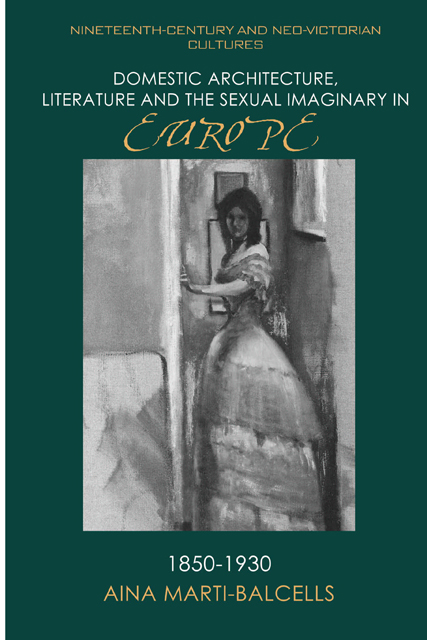Book contents
- Frontmatter
- Contents
- Series Preface
- Dedication
- Introduction
- 1 Adultery and the Subversion of Architectural Prescriptiveness in Madame Bovary and The Return of the Native
- 2 Sexual Accessibility and Exhibitionism: Glass in La Curée
- 3 Glass Dwellings and the Dissolution of Adultery in Fontane’s L’Adultera
- 4 Domestic and Sexual Circulation in Huysmans’ En ménage
- 5 Vienna: Towards a New Domestic Imaginary
- Bibliography
- Index
1 - Adultery and the Subversion of Architectural Prescriptiveness in Madame Bovary and The Return of the Native
Published online by Cambridge University Press: 02 June 2023
- Frontmatter
- Contents
- Series Preface
- Dedication
- Introduction
- 1 Adultery and the Subversion of Architectural Prescriptiveness in Madame Bovary and The Return of the Native
- 2 Sexual Accessibility and Exhibitionism: Glass in La Curée
- 3 Glass Dwellings and the Dissolution of Adultery in Fontane’s L’Adultera
- 4 Domestic and Sexual Circulation in Huysmans’ En ménage
- 5 Vienna: Towards a New Domestic Imaginary
- Bibliography
- Index
Summary
Amongst Hardy’s novels, The Return of the Native (1878) is not considered a rich example of architectural descriptions. The text tells the story of Eustacia Vye, a young woman who feels trapped in the provinciality of Egdon Heath and marries Clym Yeobright with the hope of moving to Paris with him. However, her dreams are broken when Clym shows no intention to move back to the French capital. Eustacia starts then an affair with Damon Wildeve that will lead to her own destruction. There are striking resemblances between Hardy’s main female character and Emma Bovary. In many instances, Eustacia seems to have been inspired by the character of Emma: dreams about Paris, fashion, ambition and their approaches to marriage as a way to accomplish their goals are present in both heroines. Emma and Eustacia, although different in nature, see their aspirations buried in the provincial towns of Yonville and Egdon Heath respectively. In fact, after marrying Clym, we know that ‘[Eustacia] had represented Paris […] as in all likelihood their future home. Her hopes were bound up in this dream’ (Hardy [1878] 2008: 234). It is precisely the image of Paris and its fantasies that first drives Eustacia to marry Clym: ‘a young and clever man was coming into that lonely heath from, of all contrasting places in the world, Paris. It was like a man coming from heaven’ (Hardy [1878] 2008: 108). Clym opens up the possibility of Eustacia leaving Egdon Heath for a fashionable and amusing city, in the same way as Charles Bovary is seen with the potentiality of realising all of Emma’s romantic dreams. For Eustacia, ‘to be loved to madness […] was her great desire’ (Hardy [1878] 2008: 69), while Emma, once married, ‘ne pouvait s’imaginer […] que ce calme où elle vivait fut le bonheur qu’elle avait rêvé’ (could not believe [… .] that the quietness in which she lived was the happiness she had dreamt of) (Flaubert [1856] 2001: 90). The strong longings for passion and love of Eustacia and Emma are placed in marriage, which is eventually turned into a delusion and a self-destructive experience.
- Type
- Chapter
- Information
- Publisher: Edinburgh University PressPrint publication year: 2022



